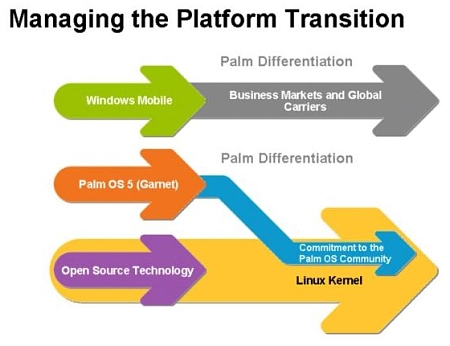Palm fesses up to Linux Treo plans
Apr 10, 2007 — by LinuxDevices Staff — from the LinuxDevices Archive — views Palm, best known for Treo smartphones powered by Palm OS and Windows Mobile, is likely to ship Linux phones this year, confirmed CEO Ed Colligan today at Palm's “Analyst and Investor Day.” Palm's Linux platform will add reliability, performance, and stability to Palm's smartphones, Colligan said.
Palm, best known for Treo smartphones powered by Palm OS and Windows Mobile, is likely to ship Linux phones this year, confirmed CEO Ed Colligan today at Palm's “Analyst and Investor Day.” Palm's Linux platform will add reliability, performance, and stability to Palm's smartphones, Colligan said.
digg this story |
During the keynote talk at Palm's Analyst and Investor meeting this morning, Colligan stated that Palm will roll out a new mobile phone platform before the end of the year based on a Linux core.
Responding to an audience question regarding when a Linux-based Palm phone might reach market, he said, “We will bring out more products this year on the existing platform, but you can also expect Linux-based products to come out from us this year as well. On the smartphone side, you can expect more traction around that in 08. There will be a transition time there.”
Colligan revealed that Palm will introduce a new foundation for its smartphones based on a Linux core. As expected, the new Linux foundation will enable Palm OS 5 (aka Garnet) applications to run on top of a Linux kernel based on open-source technology, presumably via technology developed by Access (formerly PalmSource, a Palm spin-out).

“We expect [the new Linux platform] to improve reliability and performance and stability of our Palm-based product and give us much more flexibility from a platform perspective,” Colligan said. “For example, today it is not possible to do simultaneous voice and data processing on Palm OS; we needed this functionality to be able to modernize the underlying core of that platform.” The new platform, with Linux at its core, will enable simultaneous voice/data processing and multi-threading; additionally, it will provide the flexibility to enable the company to produce more variations of its smartphones products, more rapidly, according to Palm's presentation materials.
Few details regarding the new platform are known, other than inclusion of the Opera browser and ChatterMail email client, whose developer, Marc Blank, was recently hired by Palm. Additionally, user interface technology has been acquired from Iventor, founded by Paul Mercer, “a world renowned … user interface designer, who is now part of the Palm team,” Colligan said. Palm's key objectives will continue to be “outstanding usability, great performance, easy development both for applications on the device and on the Web, and a commitment to the Palm OS developer community,” he added.
The news will hardly surprise LinuxDevices readers. We first surmised Palm to be developing a Linux device OS of its own in Oct. of 2005, when we noticed half-a-dozen jobs postings related to embedded Linux on the company's website. Then, in May of last year, we noticed Palm advertising for a “Linux Engineer — Mobile Handset,” further confirming our suspicions.
Now, it appears that Palm's Linux team has made significant progress — or at least been put under significant pressure, in the wake of poor first quarter sales, mitigated somewhat by inflated stock pricing due to acquisition rumors. Palm reportedly spent about $44 million licensing Palm OS last year.
 Windows Mobile Treo 750 (Click for details) |
Of course, most smartphone market leaders — including Linux smartphone pioneer Motorola — offer phones with a choice of OSes, in part to satisfy a broader range of operator requirements and preferences in different geographic regions around the world, and in multiple market segments, such as consumer, prosumer, and enterprise user. The news comes a year and a half after Palm added Windows Mobile to its smartphone OS arsenal — and two months after Palm's former OS supplier, Access (formerly PalmSource), shipped a Linux-based mobile phone OS of its own.
Palm's Analyst and Investor Day presentation is available (with registration) for on-demand playback, here.
This article was originally published on LinuxDevices.com and has been donated to the open source community by QuinStreet Inc. Please visit LinuxToday.com for up-to-date news and articles about Linux and open source.